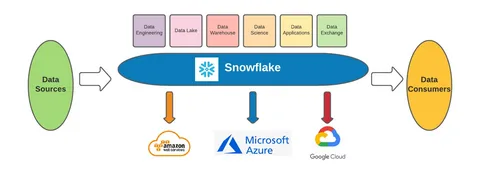In the era of big data, organisations need efficient and scalable solutions to store, manage, and analyse their vast amounts of information. Snowflake has emerged as a leading cloud-based data warehousing platform that addresses modern data challenges with its unique architecture and innovative features. Professionals seeking expertise in cloud data warehousing can benefit significantly from a Data Science Course in Hyderabad, which covers Snowflake’s applications and benefits.
What is Snowflake?
Snowflake is a cloud-based data warehouse that offers a Software-as-a-Service (SaaS) model, enabling businesses to manage their data efficiently without worrying about infrastructure complexities. Unlike traditional data warehouses, Snowflake separates storage, computing, and services, allowing for greater flexibility and cost efficiency. Learning how to optimise Snowflake for data-driven decision-making is essential to a Data Scientist Course.
Key Features of Snowflake
Snowflake is renowned for its robust capabilities, which set it apart from conventional data warehouses. It supports structured and semi-structured data, offers instant scalability, and ensures high availability with minimal downtime. Its ability to handle concurrent workloads without performance degradation makes it ideal for businesses dealing with real-time analytics. Mastering these features through the Data Scientist Course equips professionals with valuable skills in cloud-based data management.
Snowflake’s Architecture
One of Snowflake’s key differentiators is its unique multi-cluster, shared data architecture. This architecture enables organisations to run multiple queries simultaneously without any impact on performance. Snowflake’s architecture comprises three layers: the database storage layer, the query processing layer, and the cloud services layer. Understanding these layers in detail is crucial for those enrolling in this course.
Benefits of Snowflake in Modern Data Warehousing
Snowflake provides several advantages that make it a preferred choice for modern enterprises. Its key benefits include automatic scaling, pay-as-you-go pricing, seamless data sharing, and robust security measures. These features help businesses optimise costs while ensuring data integrity and security. Professionals who leverage these benefits can enhance their knowledge.
How Snowflake Enables Data-Driven Decision Making?
Data-driven decision-making relies on quick and efficient data access. Snowflake’s cloud-native approach allows users to run complex queries and derive real-time insights. Its ability to integrate with popular BI tools and support diverse data formats makes it a versatile platform for analytics. Learning how Snowflake facilitates business intelligence and reporting is a key component of it.
Snowflake vs. Traditional Data Warehouses
Traditional data warehouses often struggle with scalability, performance, and maintenance challenges. In contrast, Snowflake offers automatic scaling, no maintenance overhead, and cost-effective storage solutions. These advantages make it a preferred solution for modern enterprises. Understanding these differences helps professionals make informed choices about data warehousing solutions.
Snowflake’s Role in Big Data and Analytics
The ability to process and analyse massive datasets efficiently is critical in the era of big data. Snowflake’s support for high-speed analytics, machine learning integration, and real-time data processing makes it an invaluable tool for data scientists. A deeper exploration of its big data applications is part of it, ensuring learners stay ahead in analytics.
Integration Capabilities of Snowflake
Snowflake integrates seamlessly with various cloud services, including AWS, Azure, and Google Cloud, as well as popular data analytics tools like Tableau, Power BI, and Python libraries. This flexibility enhances its usability across different business domains. Professionals seeking hands-on experience with these integrations can do so through it.
Snowflake Security and Compliance
Security is a critical concern in data warehousing. Snowflake incorporates robust security features, including end-to-end encryption, multi-factor authentication, and role-based access control. Additionally, it complies with industry standards such as GDPR, HIPAA, and SOC 2. Learning about these security measures ensures that professionals can implement best practices for data security.
The Future of Snowflake in Data Warehousing
As businesses continue to generate and rely on data for decision-making, Snowflake’s role in the data ecosystem is expected to grow. Its advancements in AI-driven analytics, automated data governance, and multi-cloud capabilities position it as a leader in the industry. Staying updated with these trends, which cover emerging developments in data warehousing technologies, is possible.
Conclusion
Snowflake has revolutionised modern data warehousing with its cloud-native approach, scalability, and ease of use. Its ability to handle large volumes of structured and unstructured data and its seamless integration with analytics tools make it a top choice for enterprises worldwide. For professionals looking to excel in data warehousing and analytics, enrolling in a Data Science Course in Hyderabad provides the necessary knowledge and skills to leverage Snowflake’s full potential.
ExcelR – Data Science, Data Analytics and Business Analyst Course Training in Hyderabad
Address: Cyber Towers, PHASE-2, 5th Floor, Quadrant-2, HITEC City, Hyderabad, Telangana 500081
Phone: 096321 56744



